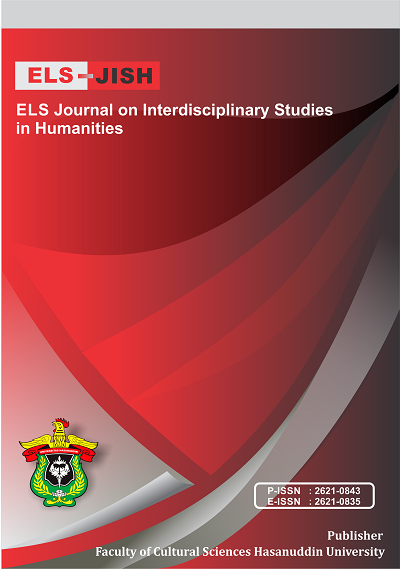EFL Learners of Pre-Service Teacher Programs’ Knowledge of Collocation and Their Perceptions on Collocation
DOI:
https://doi.org/10.34050/elsjish.v3i4.11951Keywords:
Collocation errors, grammatical collocation, lexical collocationAbstract
This paper was aimed to find out: (1) EFL learners of pre-service teaching program’s knowledge of collocation, and (2) EFL learners of pre-service teaching program’s perception about their knowledge of collocation and on collocation teaching in EFL setting. The data was collected from EFL learners of pre-service teaching programs of IKIP Muhammadiyah Maumere in Maumere East Nusa tenggara, Indonesia. To collect the data, a multiple choice of collocation test that consisted of thirty items was administered and 9 item of questionnaires about their perception toward collocation teaching materials, collocation learning methods, and collocation teaching techniques. The findings revealed that the average percentage of EFL learners of pre-service teaching program’s collocation errors through statistical analysis using SPSS 25.0 was 51, 50% (an average of 4.85 errors per participants). It was identified that 56.30% grammatical errors (an average of 10.68 errors per participants) and 42.60% lexical errors (an average of 10.54 errors per essay) were found. This implies that the most frequently committed errors were in the grammatical category. The study also revealed that 80% of EFL learners of pre-service teaching program agreed that the role of collocation in teaching and learning vocabulary was very important. 43% of them mostly learn collocations from the course book. They agreed that the most suitable level to learn o r teach collocations are from around elementary. They learn collocation bacause It is important for language proficiency while 30% of them said that techniques do you use in learning collocations was through translating. 40% of them agreed that reading was language skill(s) would be the most effective in learning collocations. The causes their collocational errors were 43% of them agreed that there is interference from Indonesian.
References
Ahangari, S., & Zununi V. (2013). A Comparative Study of the Use of Collocation in Iranian High School Textbooks and American English. File Books
Al-Sofi, M. & Baker. (2014). Qur’anic Collocations: A Problem In Translation Quranica. International Journal of Quranic Research, 6 (2).
Alsullayi. (2015). The Use of Grammatical Collocations by Advanced Saudi EFL Learners in the UK and KSA. International Journal of English Linguistics; Vol. 5, No. 1
Bahardouzt & Moeini (2012). Lexical and Grammatical Collocations in Writing Production of EFL Learners. The Journal of Applied Linguistics Vol. 5, Issue 1
Benson, M., Benson, E., & Ilson, R. (1997). The BBI dictionary of English wordcombinations. Amsterdam: John Benjamins.
Bouma, G. (2009). Normalized (pointwise) mutual information in collocation extraction. Proceedings of GSCL, 31-40.
Dweik, B., & Shakra, M. (2011). Problems in Translating Collocations in Religious Texts from Arabic into English The Linguistics Journal. 5 (1).
Fadlilah. (2016). Students’ Grammatical Collocation Errors and its’ Implication in Teaching Writing Walisongo State Islamic University Semarang IJET | Volume 5, Issue 2
Farrokh. (2012). Raising Awareness of Collocation in ESL/EFL. Classrooms Journal of Studies in Education. 2 (3) http://dx.doi.org/10.5296/jse.v2i3
Laufer, B., & Waldman, T. (2011). Verb‐Noun Collocations in Second Language Writing: A Corpus Analysis of Learners’ English. Language Learning, 61(2), 647-672.
Lewis, M., Conzett, J. (2000). Teaching collocation: Further developments in the lexical approach. Hove: Language Teaching Publications
Malenica & Mustapić. (2015). Acquisition of English Collocations through Productive Skills—Analysis of Translation Errors International Journal of English Linguistics; 5, (4);
Maryani. (2012). What English Collocations to Teach First to Indonesian Preschool Children? A mini-corpus based research of indonesian children's storybooks, Indonesian Journal of Applied Linguistics, 1 (2)
McCarthy, M. (2005). English collocations in use. Cambridge: Cambridge University Press.
Mutlu & Kaşlioğlu (2016). Turkish EFL Teachers’ and Learners’ Perceptions of Collocations Sakarya University Journal of Education, 6 (3)
Owu-Ewie & Williams 2017; Grammatical and Lexical Errors in Students’ English Composition Writing: The Case of Three Senior High Schools (SHS) in the Central Region of Ghana Sino-US English Teaching, August 2017, Vol. 14, No. 8, 463-482 doi:10.17265/1539-8072/2017.08.001
Shamsudin, Sadoughvanini & Zaid (2013). Iranian EFL learners’ Collocational errors in speaking skill. Akdeniz Language Studies Conference 2012 Procedia - Social and Behavioral Sciences 70, 1295 – 1302
Setiarini, P. (2018). Collocation Errors by Indonesian EFL Learners: Types of Errors, Translation Techniques, and Causes of Errors
Oxford collocations dictionary 2nd edition. (2009). Oxford: Oxford University Press.
Qader. (2018). The Role of Teaching Lexical Collocations in Raising EFL Learners’ Speaking Fluency Journal of Literature, Languages and Linguistics Vol.46, 2018
Rao. (2018). The Importance of Collocations in Teaching of Vocabulary. Journal of Research Scholars and Professionals of English Language Teaching, 7(2)
Rahman, F. (2018). The Constraints of Foreign Learners in Reading English Literary Works: A Case Study at Hasanuddin University. Journal of Arts and Humanities, 7(2), 01-12.
Rudzka, P., & Ostyn. (1981). More Words You Need. London: Macmillan
Torabian, M., & Subakir. (2014). Lexical collocational knowledge of Iranian undergraduate learners: implications for receptive & productive performance. 14th International Language, Literature and Stylistics Symposium. Procedia - Social and Behavioral Sciences 158
Yazdandoost, S., & Kafipour. (2014); The Relationship Among Collocation Knowledge And Listening, Speaking, Reading And Writing Proficiency Of Iranian EFL Learners. Journal of International Scientific Publications Language, Individual & Society. Volume 8
Downloads
Published
How to Cite
Issue
Section
License

This work is licensed under a Creative Commons Attribution-NonCommercial 4.0 International License.






